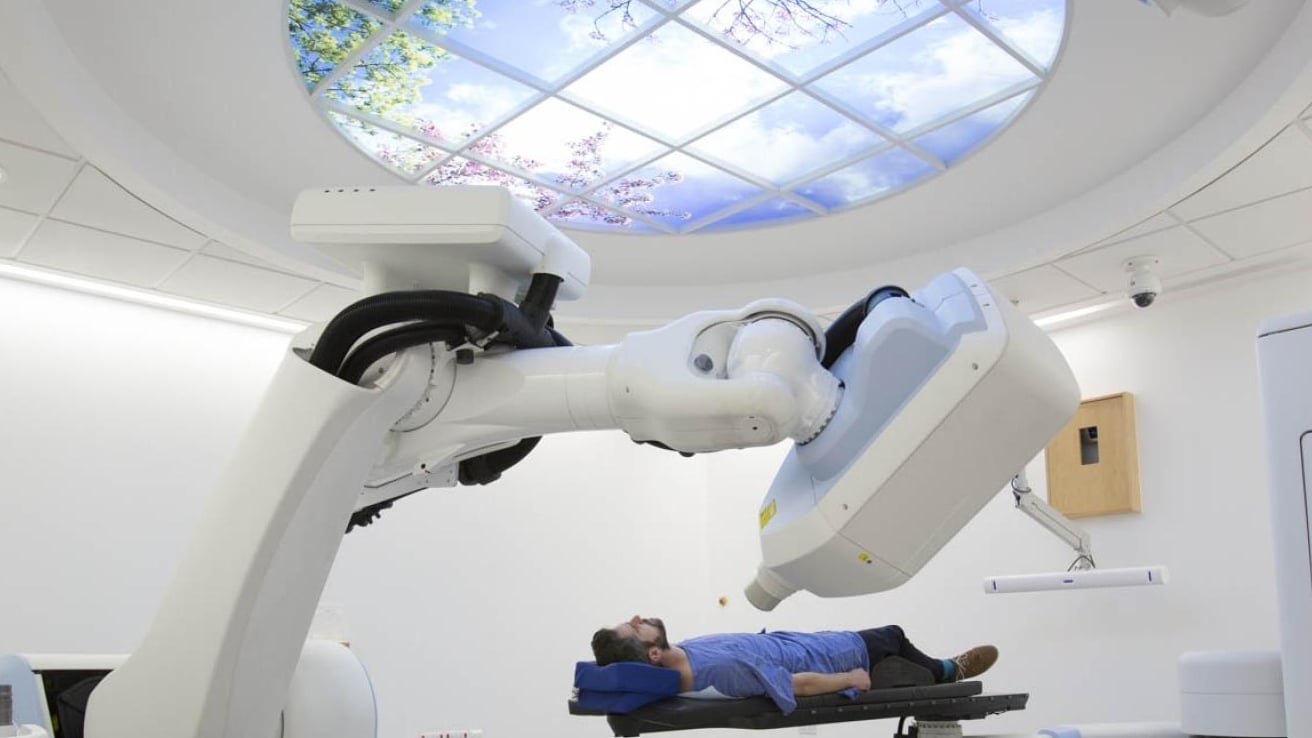
Image: Cyberknife
People with intermediate risk, localised prostate cancer can be treated as effectively using fewer and higher doses of radiation therapy delivered over five treatment sessions as they can with lower doses delivered over several weeks, according to researchers from The Institute of Cancer Research, London and The Royal Marsden NHS Foundation Trust.
Results from the PACE-B (Prostate Advances in Comparative Evidence) trial were published today in the New England Journal of Medicine (NEJM).
Fewer and higher doses of radiotherapy performed as well as standard radiotherapy
The research builds on previously reported data and shows that stereotactic body radiotherapy (SBRT) performed as well as standard radiotherapy treatment for people whose prostate cancer had not spread, demonstrating a five-year 95.8 per cent disease control rate, compared to 94.6 per cent for conventional radiation.
PACE-B investigated whether SBRT was non-inferior to conventional radiation for treating people with intermediate risk, localised prostate cancer. Non-inferiority was measured by whether patients remained free of biochemical clinical failure (BCF), defined as an increase in prostate specific antigen (PSA) levels, distant metastases or other evidence the cancer was returning, or death from prostate cancer.
Delivering radiation with pinpoint accuracy
SBRT, which can be delivered on a CyberKnife or standard radiotherapy machines, allows clinicians to target tumours to sub-millimetre precision. This approach uses advanced imaging and treatment planning techniques to deliver radiation with pinpoint accuracy, minimizing damage to surrounding healthy tissue. It delivers five high doses of radiation to patients over one to two weeks, compared to standard radiotherapy (Intensity-modulated radiation therapy, or IMRT), which delivers more moderate doses over a much longer period of time - usually around 20 sessions for patients in the UK, which can take up to one month.
The prostate gland can move unpredictably and rapidly throughout the treatment. The ability to track, detect and correct for this motion is key to ensuring the radiation is delivered to the tumour.
A robot repositions the radiotherapy beam to adjust for prostate movement
The CyberKnife platform has x-ray cameras that monitor the position of the tumour and sensors that monitor the patient’s breathing. This enables the robot to reposition the radiotherapy beam during treatment to track a moving tumour.
Five years after treatment, people treated with SBRT had a BCF-event free rate of 95.8 per cent compared to 94.6 per cent for those treated with conventional radiotherapy, demonstrating that SBRT was non-inferior to conventional radiation.
Side effects were relatively low in both groups. At five years post-treatment, 26.9 per cent of patients who received SBRT experienced grade two or higher side effects affecting the genital or urinary organs, such as urinary frequency and urgency, compared to 18.3 per cent in the conventional group. The cumulative incidence of late grade two or higher gastrointestinal effects was 10.7 per cent in patients who received SBRT and 10.2 per cent in the conventional group. At five years, 29.1 per cent of men treated with conventional radiotherapy and 26.4 per cent of men receiving SBRT reported erectile dysfunction.
'We can now give patients treatment in a fraction of the standard time'
Chief Investigator Professor Nicholas van As, Medical Director and Consultant Clinical Oncologist at The Royal Marsden NHS Foundation Trust, and Professor in Precision Prostate Radiotherapy at The Institute of Cancer Research, London, said:
“At The Royal Marsden and the ICR, we are focused on developing smarter, better and kinder treatments for patients across the UK and internationally. Standard radiation treatment is already highly effective and is very well tolerated in people with localised prostate cancer but for a healthcare system and for patients, to have this treatment delivered just as effectively in five days as opposed to four weeks is hugely significant.
“To be able to sit with a patient and say, ‘We can treat you with a low toxicity treatment in five days, and your chance of keeping the cancer at bay for five years is 96 per cent,’ is a very positive conversation to have. We expect our trial to be practice changing and people with intermediate risk prostate cancer should be given the option of SBRT as an alternative to conventional radiation or prostate surgery.”
Professor Emma Hall, Co-Director of the Clinical Trials and Statistics Unit at The Institute of Cancer Research, London, which is managing the PACE-B trial said:
"It's fantastic that advances in radiotherapy mean we can now give patients treatment in a fraction of the standard time. This is a game-changer for patients – meaning they receive a highly-effective cancer treatment while spending less time in hospital and travelling to appointments."
"It's another example of how the rapidly advancing field of radiotherapy can improve patients' lives."
The PACE-B trial was funded by Accuray, sponsored by The Royal Marsden, coordinated by the Clinical Trials and Statistics Unit at The Institute of Cancer Research (ICR-CTSU) and endorsed by Cancer Research UK. ICR-CTSU receives core programme support from Cancer Research UK and is accredited by the UKCRC.
PACE is an umbrella of trials supported by funding from The Royal Marsden Cancer Charity. The CyberKnife at The Royal Marsden was funded by The Royal Marsden Cancer Charity.